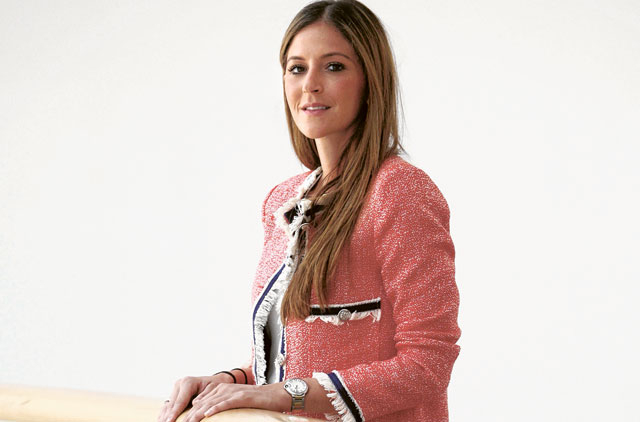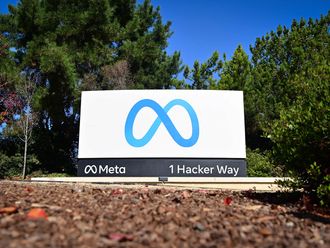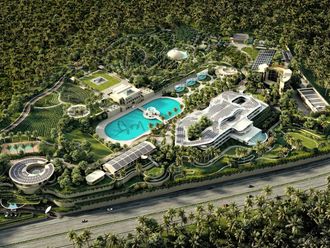
Zeina Tabari is a smart young executive with extremely sharp senses that help her not only to smell rats, but also see the future. Ten years ago, when she started her career at Drake and Scull International (DSI), a mechanical, electrical and plumbing (MEP) contractor owned by her father Khaldoun Rashid Tabari, little did she know about the corporate world or how business is done.
Later she not only saw the future of the company — going public — but played a role in transforming it for an initial public offering (IPO) in 2008.
Taking a private family-owned business public requires more than simply going to the capital markets and raising funds — it's a whole lot of hard work, not to mention change.
"It needs a change in mindset, habit, culture — corporate culture, which luckily is picking up in the UAE and the region," says Zeina, who is the Chief Corporate Affairs Officer of DSI.
"It needs a fundamental change in attitude among corporate leaders. In the case of DSI, it was virtually a re-engineering of the company, its systems, processes and re-aligning the human resources in line with the requirements. In many ways, it was a sea change."
Zeina helped steer the company through its IPO and on to its public listing on the Dubai Financial Market and has since been inspired by the opportunity to implement DSI's corporate strategy.
Family businesses still account for nearly 70 per cent of the commercial infrastructure and offer the primary employment option to the population, according to the latest research by Al Masah Capital. It also shows that the success of family businesses is more sharply reflected in this region than in other parts of the world.
"They have been efficient, driven by a traditional value-based work ethos that has wedded seamlessly with cutting-edge technology and strengthened by pride in the family name. Today, roughly 5,000 medium to large family firms exist in the Middle East, with net assets totalling $600 billion [Dh2.2 billion]. These companies constitute 75 per cent of the private sector economy and employ 70 per cent of the labour force in the GCC region," the report says.
Last IPO
Examples of such success stories include the Al Rajhi family (Saudi Arabia), the Al Ghurair, Al Futtaim, Al Naboodah, Al Habtoor, Al Rostamani, Juma Al Majid, Nasser Rashid Lootah, Al Moosa, and Yousuf Habib families (UAE), the Al Kharafi family (Kuwait), the Kanoo family (Bahrain) and the Sawiris family (Egypt).
"All these entities share a common history in that when the region was undeveloped they came in as pioneers and gradually but sturdily built their empires, relying on their bloodlines to form the management cadre," the report says.
The average worth of such family businesses in the Mena region is now about $600 million, Al Masah Capital says.
However, in the case of Tabari, it was a first generation business while most of the above had come through multiple of generations. He did not have that privilege of a famous family name backing them. Khaldoun had to work his way up as a professional and then take over the company. His was a much tougher road.
Taking such a company to public needed a solid re-engineering.
That's why Zeina worked in almost every department of the company, and learned how it works inside out, before taking over the human resources and public affairs. In this process, she also had to work with financial advisers, who help private companies go public, in London and with publicly listed companies in the UK's financial district. During that period, she learned the process well. Policies and procedures need to be revamped and upgraded to support the new company structure and regulatory requirements.
"It was a long-drawn procedure, took a lot of time to finalise. In most cases, we did not have policy guidelines, or rulebooks. I had to create them," she recalls.
In July 2008, DSI raised Dh1.2 billion by offering 55 per cent of the company's shares to the public in an IPO that was 101 times oversubscribed pulling in Dh132 billion in subscription. The shares were priced at Dh1 each plus an offering cost of Dh0.02 per share.
DSI IPO was the last public offer before the global financial tsunami hit the UAE economy in September 2008.
"Frankly speaking, we were not expecting oversubscription, not at such a level. But it was the peak of the economic boom and investors were hungry for more," she says.
The history of Drake & Scull dates back to the 1880s, beginning with two British plumbers — Bernard Drake and Arthur Stanley Scull.
Arthur Scull, born in Bristol in 1860, was one of 11 children. At the age of 14, he apprenticed in plumbing to earn a living.
Arthur Scull started his company at a small rented workshop in Milk Street, Bristol in 1881. For the first few years, his "sanitary engineering" business remained small.
In 1886, Bernard Drake borrowed £500 (Dh2,930) from a wealthy aunt to form a company, Drake & Gorham. Both men had installed electric lighting into the homes of European kings.
In 1964 Drake & Gorham and Arthur Scull & Sons merged to form Drake & Scull Engineering.
Drake and Scull International established its first office in the region in Abu Dhabi in 1966, and it has since expanded its operations to include offices in Dubai, Jordan, Libya, Thailand, Qatar, and Oman, with the leadership and guidance of Khaldoun Tabari, who took over the company's Middle Eastern operations in the Mid 1990's.
Later, Khaldoun R. Tabari, a Jordanian Arab businessman, took over the company's Middle East operations.
Although Tabari's family and other shareholders still own 45 per cent of the company, Zeina says, it is not run as a family business.
"We now have a firm management team led by the Board of Directors, which has three independent committees reporting to it — the Executive Management Committee, Audit Committee and Remuneration Committee — with each having its roles clearly defined," she says. "That way, the role of our family or other shareholders is quite limited. We do not interfere in the company's functioning, which is being overseen by the respective committees. The company is guided by the Board that gives strategic direction."
However, the board's composition is crucial in ensuring corporate governance.
Dr Henry Azzam, Chairman, Deutsche Bank, Mena, emphasised the need for corporations in the GCC to look to improve their boards' composition and directors' capabilities to enhance corporate governance for a stable economy in the region.
"The recent financial meltdown has played an important role in pressurising all companies to look to lifting their boards' effectiveness," Dr Azzam says. "However, for the GCC to strengthen its corporate governance, we need boards with the right knowledge and expertise to enhance best practices and further integrate the region's financial and economic efficiency."
Succession
While family businesses did enjoy the positive fallout of the boom years they need to revamp their priorities and face the challenges of globalisation and competition from the multinational corporations. Also, the closed-door approach that worked well in the past now needs different skill-sets that are only available in the open market and family businesses have to invest in them.
As a result of this growing awareness to change the paradigm almost three-quarters of family-owned businesses in the Middle East are likely to move from the second generation to the third, Al Masah Capital says.
The worrying part is that surveys conducted in the past indicate that just one of ten family-owned businesses survive to the third generation.
In that context, Zeina said, going public has been the best decision for the company. "We changed the company in such a way that it is no longer dependent on one individual the founder," she says.
Khaldoun R. will retire as Chief Executive Officer and take on the vice-chairman's role by first quarter of 2013.
"The company will run as efficiently after my father's retirement, as it is run today. There is no doubt about it. So, whoever becomes the CEO, the company will be managed the same way as it is now — that's the best thing about making a company run by professionals and professionally so that it is not dependent on one person," she says. "I'm glad that we have made that transformation well in time."
What about succession? Who will be the next CEO?
"I'm not," rules out the otherwise heir-apparent. "The company's core businesses are managed by three managing directors and a capable corporate management team. One of them could be chosen for the position."
A Booz & Co study says CEOs promoted from within the company have historically produced superior returns for their shareholders, and last year the gap widened as insiders generated total shareholder returns on a regionally adjusted basis of 4.6 per cent, compared with 0.1 per cent produced by outsiders.
Although Dubai is a major global business and financial hub, Corporate Dubai has a very diverse mix of professionals and business leaders. While it has no shortage of Western educated, finance-savvy corporate professionals on the one hand, the city is also full of business leaders, who have difficulty in understanding simple business drafts, on the other hand. It isn't also rare to find some who still use finger-print instead of signature.
Although Zeina praises UAE's corporate world as being "very cosmopolitan, very professional where women are allowed to lead businesses freely", there are different views on the same subject as well.
"If you are dealing with a locally owned business you are likely to find that they are family-owned and controlled. Nepotism is still a way of life and key positions will often be filled by trusted family members," says Worldbusinessculture.com, an online business consultant.
Strongly hierarchical
"As with most family-owned organisations, the company will be organised along strongly hierarchical lines with the majority of power being held at the top by the senior, usually older, male family members."
As all business is family and relationship-based, it is absolutely vital to be prepared to devote as much time and effort as necessary to relationship-building, it says.
Multaq Al Morished, Governor of Board of Directors' Institute, says: "In challenging financial times, the importance of strengthening our governance infrastructure is reinforced and that would help us in building better boards on both a corporate and country level."
Dubai also is host to well-educated leaders and professionals, but with a tribal mentality. Kito De Boer, Director, McKinsey & Company, emphasised the need for family-owned businesses to strengthen their governance practices to ensure survival. "From our experience, there are two types of family businesses. One being business-driven family businesses and the other being family-driven businesses," he said in a speech at a recent forum.
"The second type, although successful, often finds it challenging to survive after the second generation. It is therefore important to have the right balance between ‘the family' and ‘the business' and ensure that one does not come at the expense of the other."
Corporate Dubai is a better mix of first-generation to third-generation businessmen and women from a wide geographic reach that makes doing business interesting as well as difficult at times. The difference in their levels could be felt from the way they speak English — their accents — from posh British/American English to Italian/Hispanic English to Hinglish (Hindi-English mixture). The latest addition to these is the Chinese-English (Chinglish) — that, by the way, gives almost every English word a whole new meaning.
"When we started looking at the possibilities of taking it public, most people did not know what investor relations is and what corporate governance meant," Zeina says. "But things have changed a lot since then."
Norms of governance
Corporate governance is a term that refers broadly to the rules, processes, or laws by which businesses are operated, regulated, and controlled.
A well-defined and enforced corporate governance provides a structure that, at least in theory, works for the benefit of everyone concerned by ensuring that the enterprise adheres to accepted ethical standards and best practices as well as to formal laws.
Transparency
Families in the Mena region are large by global standards; the average family size is almost double that of comparable enterprises in the US and the UK.
In the new context a large family base could lead to conflicts or disputes that, in turn, could adversely impact the family business or even threaten to split it. Such fragmentation weakens the base. By that token, credit defaults have also raised the issue of transparency or the lack of it for several family-owned businesses in the region. As a result, business houses are finding it far more difficult to find easy credit.
"There was a time where only the family name was sufficient to open doors but that is not a guarantee anymore," added Shailesh Dash, Founder and Chief Executive of Al Masah Capital.
"To stay in the race and hold their position the decision-makers in these very powerful commercial houses have to bring on board a more 21st century approach. This includes modernisation, the need to put in place proper compliance, risk management and accounting platforms and factor in talent with authority even if it is not from within the family. Those who can blend the past with the future are the ones that will weather the changing pattern," he said.













